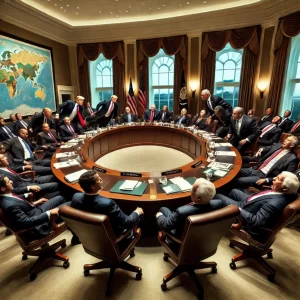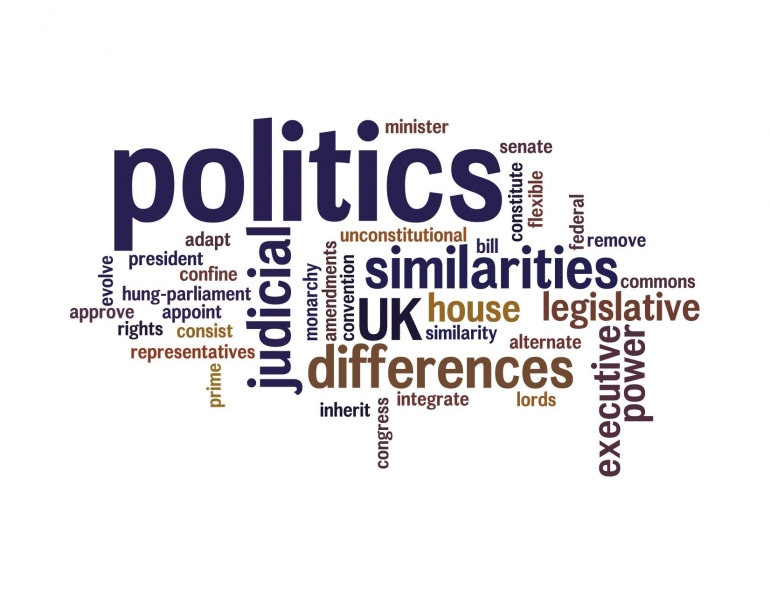NEXT UP, Sept 2025, It Didn’t Have to Come to This: The Bipartisan Border Bill Was Flawed—But It Was a Missed Opportunity

By Dr. Christopher Miller
Editor @ The Moderate Report
The chaos unfolding in our immigration system today was not inevitable. The militarized zones at the southern border, mass deportation raids, and the near-total collapse of asylum access were not preordained outcomes. These are consequences—consequences of a deeply fractured political system that rejected a bipartisan compromise in favor of partisan extremes. While the 2024 bipartisan immigration bill was far from perfect, it offered a middle path that, had it passed, might have spared us the fear, division, and constitutional strain we are now experiencing.
A Compromise Too Unpopular for Extremes
Crafted after months of negotiation, the bipartisan bill was a political anomaly: a genuine compromise. It offered Republicans stricter asylum rules, enhanced border enforcement, and provisions to temporarily close the border if migrant crossings surged. For Democrats, it offered stabilizing resources and aid to Ukraine and Israel. But it was also a bill with painful absences—there were no protections for Dreamers, no legalization pathways for long-term undocumented residents, and little attention to humanitarian relief.
Still, it represented movement—a recognition that something had to give. Unfortunately, that middle ground collapsed when former President Donald Trump, campaigning for reelection, torpedoed the bill as “too weak.” Republicans, fearing backlash from Trump-aligned voters, backed away—even co-sponsors like Senator Lankford ultimately voted against it. On the left, progressives like Senator Padilla rejected the bill for its lopsided focus on enforcement and lack of compassion. And so, a bill built on compromise died in a moment of maximum political polarization.
What We Got Instead: A Draconian Shift
Trump’s return to the White House has brought a rapid and radical overhaul of immigration policy. His administration has declared a national emergency at the border, deployed thousands of military personnel, and created zones under military control. New daily arrest quotas, an unprecedented goal of one million deportations annually, and fast-tracked removals—even in protected places like schools and hospitals—have become the new standard.
Asylum has been all but eliminated at the southern border. Refugee admissions are paused. Humanitarian parole is suspended. DACA and TPS are being systematically dismantled. Local police forces are now effectively deputized to enforce immigration laws, and fines are levied daily against undocumented immigrants who haven’t complied with removal orders.
The human toll is escalating: families torn apart, workers and students living in fear, and legal challenges piling up in courts across the country. Protests have erupted in major cities and border towns alike. In Los Angeles, tens of thousands rallied against deportation raids. In Chicago, activists shut down intersections near ICE field offices. Faith leaders, teachers, healthcare workers, and business owners have joined in, alarmed by the sweeping nature of the crackdown.
It Could Have Been Different
Let’s be clear: the bipartisan bill had serious flaws. It failed to provide relief for millions of immigrants who have lived, worked, and contributed to American communities for years. It leaned heavily into enforcement without adequately addressing root causes or offering a humane path forward. But it was a starting point. It was governance. It was what democracy looks like when adults sit at the table, concede something, and try to fix a broken system.
Now, instead of imperfect progress, we face extreme overreach. Instead of a structured, negotiated approach, we have executive fiat and constitutional strain. And the very same Republicans who derided the bill as “soft” are now standing behind policies that many legal scholars, civil rights groups, and even conservative business leaders see as unsustainable and damaging to the economy and the rule of law.
A Warning for the Future
The failure of the bipartisan bill should be a lesson—not just about immigration, but about our political climate. When compromise becomes a dirty word, when leaders choose posturing over policymaking, and when fear trumps facts, we end up exactly where we are now: with policy driven by extremes, communities in crisis, and a nation divided.
The 2024 immigration bill was a missed opportunity. It didn’t have to come to this.
We can—and must—do better.
The Moderate Report is committed to balanced, evidence-based commentary that calls out extremism from both sides while advocating for pragmatic, solution-oriented governance.
Next up: The Trump Grift That Should Outrage Everyone — and the Deafening Silence of the Democrats

By Dr. Christopher Miller | The Moderate Report
If you’re not furious about what’s unfolding with Trump, Qatar, and the quiet complicity of both political elites and an underperforming Democratic Party, you’re not paying attention. The latest chapter in Trump’s unending grift comes with a $400 million Qatar-owned luxury 747 jet “offered” for his potential second term — supposedly for Air Force One use. While Trump insists it’s not a gift to him, the jet would be retired for his “presidential library” post-presidency. The stench of corruption, national security risks, and foreign influence is thick — and yet, Democrats are floundering instead of leading.
A “Gift” Wrapped in National Risk and Political Influence
This plane, formerly owned by a foreign government with deep ties to Islamist extremist groups including Hamas, is being framed as a gesture of goodwill. But let’s be clear: this is soft corruption disguised as diplomacy. Qatar has been one of the largest financial backers of Hamas, funneling nearly $2 billion to the Gaza-based terrorist group and hosting its leaders in Doha. Meanwhile, Qatar maintains a strategic relationship with the United States, hosting a major U.S. airbase and engaging in diplomatic negotiations.
But offering a luxury aircraft — with plans to hand it off to Trump’s private library — places us in direct conflict with the U.S. Constitution’s Foreign Emoluments Clause. It raises the question: is this a gift to America or a gift to Trump?
Is It Really a Bargain?
Some might argue the U.S. should take the deal — that saving the $400 million on the airframe is worth it. That’s a lie of omission. Retrofitting a used or foreign aircraft to meet Air Force One standards (encrypted communications, missile defenses, anti-surveillance systems, EMP shielding, in-flight refueling, and hardened cybersecurity) costs up to $2 billion per plane. The jet’s prior ownership by Qatar introduces unique security risks: potential surveillance devices, firmware exploits, or hard-to-detect backdoors.
The U.S. is already spending billions to modify two 747-8s for the next-gen VC-25B aircraft. Accepting the Qatar jet might save on the airframe itself — but not on the infrastructure needed to make it secure. And it may very well cost more in reconfiguration delays and risk management.
Where Are the Democrats?
Adam Kinzinger — one of the few Republicans with the guts to speak out — recently highlighted a missed opportunity by Democrats. He said the party fails not because they don’t have facts, but because they’re “terrible at telling stories.” He’s right. At a time when the public is ripe for clarity, Democrats are either whispering about ethics or over-intellectualizing policy details. Meanwhile, Trump is promoting DOGE coin and letting his family rake in crypto profits, overseas hotel deals, and Gulf partnerships — all while voters face a looming recession and skyrocketing prices.
Americans are looking for leaders who can connect the dots. Instead, the party that should be shouting from the rooftops is busy fine-tuning white papers. The GOP’s bad-faith attacks have filled the vacuum.
The Grift Continues — And So Does the Silence
This isn’t just about a plane. It’s about a pattern. The Trump family has long blurred the lines between public service and personal profit. Whether it’s Jared Kushner’s $2 billion post-White House fund from the Saudis or Trump’s continued deals in the UAE and Qatar, it’s clear: this family never left the business of grifting. The crypto scam now associated with Trump’s name raised millions — no clear regulatory framework, no accountability, and no outcry from the party that should be fighting it.
Trump is selling image, access, and now possibly foreign-backed infrastructure under the guise of patriotism. He’s doing it while riding high on a populist brand — the same brand that’s leaving working-class families behind.
Conclusion: This Is a Test of American Integrity
We should all be asking: why would Qatar, a nation with deep Hamas ties, offer Trump a $400 million aircraft, while his family seals business deals and launches speculative crypto ventures? Why are Democrats treating this like a delicate matter of protocol instead of the existential democratic crisis that it is?
The answer lies in political courage — or the lack of it. The Trump-Qatar jet scandal isn’t just about ethics violations. It’s about national security, foreign influence, and the slow, corrosive rot of democratic norms. And it’s about the opposition’s failure to do the one thing it must: lead.
If Democrats can’t step up, someone else will fill the void. And if Trump returns to power — this time in a Qatar-furnished, missile-shielded, crypto-fueled Air Force One — history will remember not just the grift, but the silence that enabled it.
Sources
- Amiri, R. (2024). Foreign Gifts and the Constitution: Revisiting the Emoluments Clause. Brookings Institution.
- U.S. Air Force. (2023). VC-25B Program Overview. Retrieved from https://www.af.mil
- Kinzinger, A. (2024). Unheard Warnings: The Danger of Silence in the Democratic Party. Interview on CNN.
- Goldberg, J. (2023). Qatar and Hamas: A Complicated Alliance. The Atlantic.
- Office of Government Ethics (OGE). (2023). Guidance on Gifts from Foreign States to U.S. Officials.
NEXT UP:
The Deportation of Kilmar Abrego Garcia: Caught Between Politics, Policy, and a Broken System

By The Moderate Report
Balanced Perspectives for Unbalanced Times
Kilmar Abrego Garcia isn’t a hero—but his case is exposing deep cracks in our immigration system, along with tone-deaf messaging from Democrats and a dangerously unchecked use of power by the Trump administration.
Garcia, a Salvadoran national, entered the United States more than a decade ago fleeing gang violence. He settled in Maryland, where he built a life with his wife (a U.S. citizen) and their three children. He supported his family working legally under a valid work permit, which he received after an immigration judge ruled he could not be deported back to El Salvador because of credible threats to his life.
He was far from invisible. Garcia checked in regularly with ICE. His case was tied up in a long legal process common to immigration proceedings. While not a U.S. citizen, he was complying with the rules as they applied to him. That alone should give pause when considering what happened next.
A Deportation That Went Too Far
Despite ongoing legal protections, Garcia was arrested and deported in March 2025—abruptly and in direct violation of a federal judge’s order. He was sent not just back to El Salvador, but directly into a notorious prison there, without access to a lawyer or information about his status. Even the Trump administration has since called it a “procedural error.”
This was not just an ordinary removal—it was a punitive act far more aggressive than many Americans, even those supportive of stronger immigration enforcement, expected from the return of Trump-era policy.
Let’s be clear: Garcia is not a perfect victim. There are allegations—though unproven and never resulting in conviction—of gang affiliation. He was documented in field reports by police, though one of the detectives involved was later suspended for unrelated misconduct. He is not a cartoon character of innocence. But neither was he convicted of any crime in the U.S., and under our legal principles, allegations are not the same as guilt.
The Celebrity Visit and Democratic Missteps
In a move that felt more symbolic than strategic, a U.S. senator visited El Salvador to meet with Garcia. A makeup artist was reportedly brought along to prepare Garcia for media photos, an odd move that played poorly with the public and opened Democrats up to ridicule. Worse, it reinforced the perception that the party is more concerned with optics and individual cases than with addressing the fears and concerns of average Americans.
And here lies the problem: Democrats have allowed themselves to become tangled up defending a single man, while avoiding broader, more politically uncomfortable conversations.
Yes, Garcia may have been wrongfully deported. Yes, due process matters. But many Americans are also reading headlines about crimes committed by undocumented immigrants—including a widely reported recent case involving the tragic death of a woman while jogging. When Democrats fail to acknowledge those stories or the real concerns they raise, it creates a vacuum that Republicans are only too happy to fill.
Conservatives and Courts: Selective Rule of Law?
The irony here is rich: The same conservative justices that Republicans typically champion have ruled unanimously that Garcia should be returned. The administration’s refusal to comply with the Supreme Court is a direct affront to the legal system and the rule of law. Yet few GOP lawmakers have spoken out, having effectively given the executive branch a blank check on immigration policy.
This selective respect for the judiciary should trouble everyone. You can’t champion the Constitution while ignoring it when it’s inconvenient.
A Practical Path Forward
The reality is this: Holding full hearings for every undocumented person facing deportation is not feasible. The system is already backlogged, and taxpayers do not want to spend billions more funding lengthy legal proceedings for all cases.
But there’s a middle path—one that recognizes practical limits without abandoning humanity:
Triage and Prioritization: Use data-driven criteria to identify low-risk individuals—like those with valid work permits and no criminal convictions—for alternatives to detention or for voluntary departure, not brutal imprisonment.
Transparency and Oversight: Require that expedited removals be reviewed by a neutral panel within 30 days, especially when there is a prior legal order or protection in place.
International Human Rights Compliance: Even when deportation is lawful, individuals should not be sent to known abusive detention systems without recourse or monitoring. The U.S. must work with partner countries to ensure humane treatment post-deportation.
Messaging that Connects: Democrats must do better at speaking to public safety, border control, and the rule of law—while also defending constitutional protections. It’s not either/or.
Legislative Guardrails: Congress should revisit bipartisan immigration reform with updated provisions limiting the use of pre-World War I-era laws like the Alien Enemies Act for modern deportation policy. That’s not reform—it’s legal gymnastics.
Kilmar Abrego Garcia’s case is not about whether immigration enforcement is needed. It’s about how we do it—and whether we can balance law, order, and dignity.
The American center is not silent. It’s watching. And it wants solutions—not slogans.
Up Next:
🗳️ Are Anti-Trump Protests Helping or Hurting the Democratic Cause?
By The Moderate Report
Balanced Perspectives for Unbalanced Times
🔥 The Protest Wave: Concern or Counterproductive?
Across the country, the protests are growing louder—and larger. Outraged by Donald Trump’s erratic policies, from confusing trade tariffs to his decision to attend a LIV Golf tournament instead of honoring fallen U.S. soldiers at Dover, Americans are taking to the streets.
The passion is clear. But the impact is up for debate.
On one side, these protests are a loud reminder that many Americans still reject Trumpism. On the other, critics say they’ve become more about performance than policy—a venting session that lacks direction. And when headlines turn to vandalized Teslas or shouting matches at rallies, it plays right into the right-wing narrative: that the left is unhinged and unserious.
🏛️ Where Are the Democrats?
Aside from a few standout moments—like Senator Cory Booker’s marathon floor speech, or fiery rallies from AOC and Bernie Sanders—the Democratic Party has been relatively quiet on the national stage. There’s frustration, but little evidence of a unified message or strategy that addresses Trump’s chaotic moves head-on.
Meanwhile, media echo chambers are hard at work. When the markets took a nosedive, Fox News pulled its stock ticker and filled its homepage with stories about “wokeness,” completely ignoring serious issues like U.S. security officials using unsecured apps to communicate.
This disconnect between actual policy concerns and the right’s cultural distractions makes it harder for voters to see what really matters.
🧠 What Moderates Should Be Asking
In all this noise, moderates—if they still exist—may actually have the biggest opportunity.
✅ Could this be the moment for a calm, reasonable alternative to rise?
✅ Can moderates from both parties come together with a strategy people actually understand and support?
It starts by asking the right questions—and then building a plan.
✅ A 5-Point Strategy for America’s Middle Ground
Here’s what a moderate coalition could look like if it wants to reclaim the national narrative:
1. 📉 Talk About the Economy—Not “Wokeness”
Get back to basics: inflation, jobs, housing, and healthcare. Leave the culture war headlines behind.
2. 🏛️ Protect Institutions
Support bipartisan efforts to restore public trust—secure communications, military protocols, and election protections.
3. 📣 Lead with Real Policy, Not Performative Rage
Creative protest signs are cool—but they won’t fix broken systems. Voters want details, not drama.
4. ❌ Condemn All Extremes
Vandalism, violence, and toxic rhetoric—no matter the side—must be rejected. Period.
5. 🗳️ Speak to the Politically Homeless
Most Americans don’t live on the far left or far right. Speak directly to them, and offer something better.
🤔 So, What Now?
Massive protests show that people care—and that’s important. But without direction, those efforts risk becoming background noise.
If Democrats want real change, they need to move past slogans and craft a clear, unified plan. If Republicans want to regain credibility, they need to ditch the distraction playbook and focus on governance.
And if moderates want to lead?
Now’s the time.
🗣️ Join the Conversation
Have thoughts on this topic? Leave a comment below or subscribe for more moderate takes on America’s political chaos.
📬 Stay informed. Stay balanced.
Subscribe to The Moderate Report today.
NEXT UP:
Chaos with Trump and Ukraine: A Warning for Moderates and the Center-Right

By Dr. Christopher Miller
As the war in Ukraine continues into its third year, the geopolitical stakes for the United States have never been higher. Yet, recent political developments in Washington and the resurgence of Donald Trump as a major political force have introduced alarming uncertainty into America’s commitment to Ukraine. The consequences of Trump’s erratic foreign policy decisions—both past and present—are undeniable, and even moderates and center-right Americans should be deeply concerned.
Zelensky: A Leader Fighting for His Country Amid Betrayal
Ukrainian President Volodymyr Zelensky has led his country through an unprecedented war of survival, standing resolute against Vladimir Putin’s unrelenting aggression. Yet, Zelensky has not only had to fight Russian forces; he has also faced political landmines set by former President Trump. From the very beginning, Trump has undermined Ukraine’s sovereignty, prioritizing his own political interests over national security and global stability.
The 2019 Ukraine Scandal: Before the full-scale Russian invasion, Trump infamously attempted to shake down Zelensky by withholding vital military aid, demanding that Ukraine provide damaging information on Joe Biden. This act of extortion—one of the key reasons for Trump’s first impeachment—was a blatant betrayal of an ally facing existential threats from Russia. Even then, Trump viewed Ukraine as a pawn for his own political gain rather than a nation deserving of American support.
Abandonment in 2024: Today, Trump and his political allies continue to attack U.S. support for Ukraine. He has promised to end the war “in 24 hours” through negotiations that would undoubtedly favor Putin. His rhetoric has emboldened the far right and even some traditional Republicans to call for cutting off aid, leaving Ukraine vulnerable. The recent Republican-led push to reduce aid to Ukraine is not just a political maneuver—it is a dangerous capitulation to Putin’s strategic interests.
Putin’s Atrocities: A Threat to Americans and Global Security
Vladimir Putin’s war crimes are well-documented, yet some American politicians, including Trump, downplay or even excuse them. Putin does not just wage war on Ukraine; he actively targets Americans and democracy itself.
- Imprisoning Americans: Putin has unlawfully detained multiple American citizens, including journalist Evan Gershkovich and former Marine Paul Whelan, using them as bargaining chips in geopolitical negotiations.
- Crushing Political Opponents: Russian dissidents such as Alexei Navalny have been imprisoned, poisoned, or murdered for daring to oppose Putin’s rule. The pattern is clear—Putin does not tolerate dissent, and his repression extends far beyond Russia’s borders.
- Cyber Warfare Against the U.S.: Russian cyberattacks have cost American businesses billions of dollars. Recent reporting has revealed that the Pentagon’s cybersecurity efforts to counteract Russian aggression have been paused under the leadership of Trump-aligned defense officials, leaving America more vulnerable than ever.
Trump’s embrace of Putin should alarm all Americans, regardless of political affiliation. The Russian leader has systematically worked to undermine U.S. democracy, yet Trump continues to praise him, pushing policies that weaken American deterrence against authoritarian aggression.
The Dangerous Russia-North Korea Alliance
Russia’s growing alliance with North Korea is another direct threat to American security interests. Intelligence reports confirm that North Korea has been supplying Russia with weapons for use in Ukraine. The United States has long maintained that North Korea’s military ambitions are a direct threat to global stability. By weakening support for Ukraine, Trump-aligned Republicans are indirectly supporting a growing North Korea- Russia military alliance. This reckless abandonment of Ukraine not only benefits Putin but also strengthens Kim Jong-un’s position in the region, further destabilizing global security.
Historical Context: The U.S. Has a Moral and Strategic Obligation to Support Ukraine
Since Ukraine’s independence from the Soviet Union, the United States has played a pivotal role in ensuring its security. The 1994 Budapest Memorandum, signed by Ukraine, the U.S., the UK, and Russia, saw Ukraine give up its nuclear arsenal in exchange for security assurances. By turning its back on Ukraine now, the U.S. would be violating its own commitments and encouraging global instability.
John Bolton’s Stark Warning
Even figures like John Bolton, Trump’s former National Security Adviser and a lifelong conservative, have sounded the alarm. Bolton has warned that Trump’s approach to Ukraine amounts to surrendering to Putin and could ultimately lead to NATO’s collapse. He has also expressed concern over the growing isolationist faction within the Republican Party, which threatens to dismantle decades of bipartisan foreign policy consensus.
Why Moderates and Center-Right Americans Should Care
Many moderates and traditional conservatives have supported Trump in the past for reasons related to economic policy, judicial appointments, or deregulation. However, his reckless foreign policy decisions should give every American pause. A weakened Ukraine means a strengthened Russia and North Korea. It means a world where the U.S. no longer stands up for democracy and where authoritarian leaders dictate global affairs.
Supporting Ukraine is not just about foreign policy—it is about defending American values, national security, and economic interests. The recent cuts in aid, pauses in cybersecurity defenses, and Trump’s continued coziness with Putin should be deeply concerning for anyone who values a strong, independent United States.
If America abandons Ukraine, it is not just Ukraine that will suffer. Our own democracy, economy, and global standing will be the next casualties.









